Charles E W Bean, Diaries, AWM38 3DRL 606/5/1 - April - May 1915 - Part 1
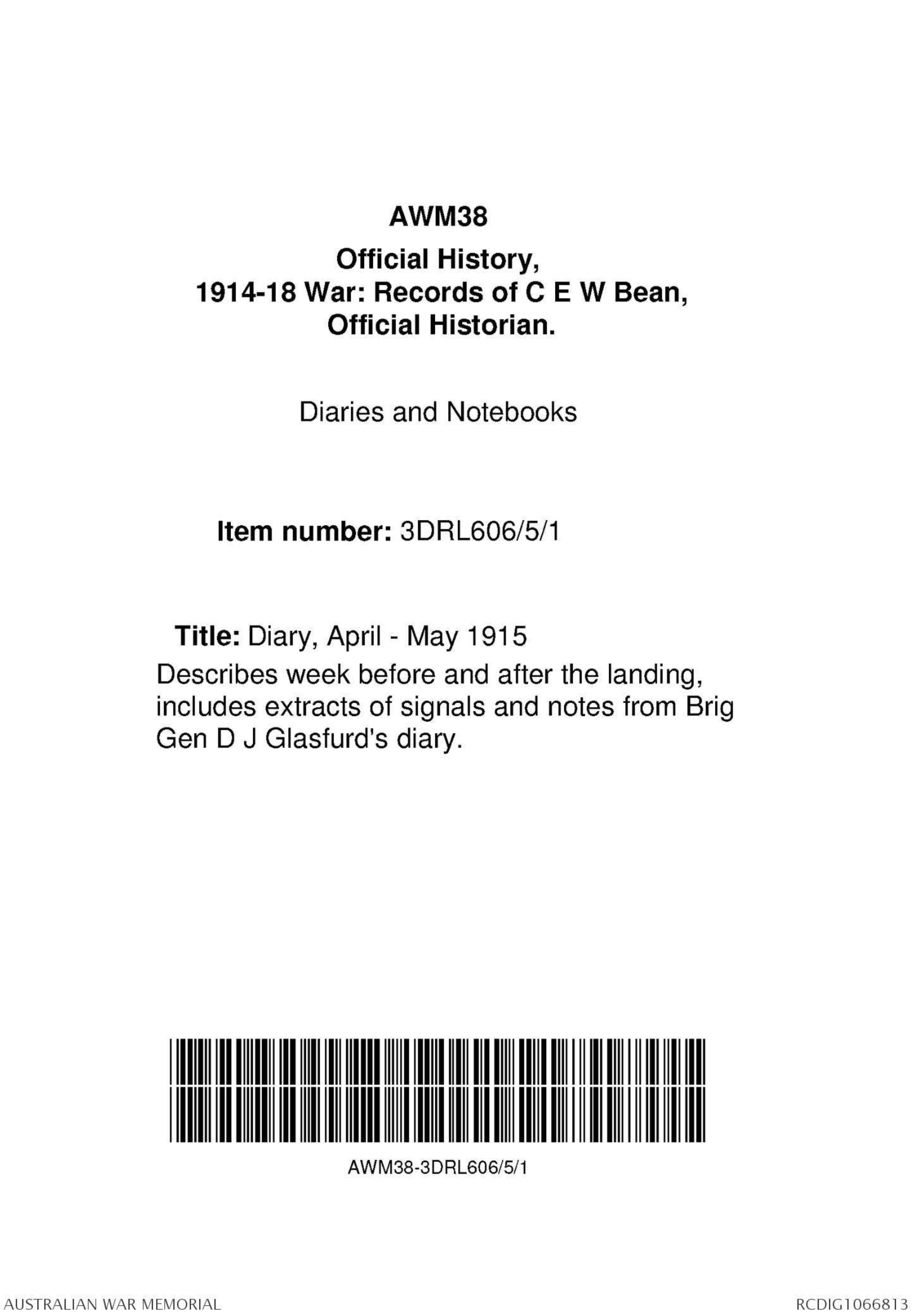
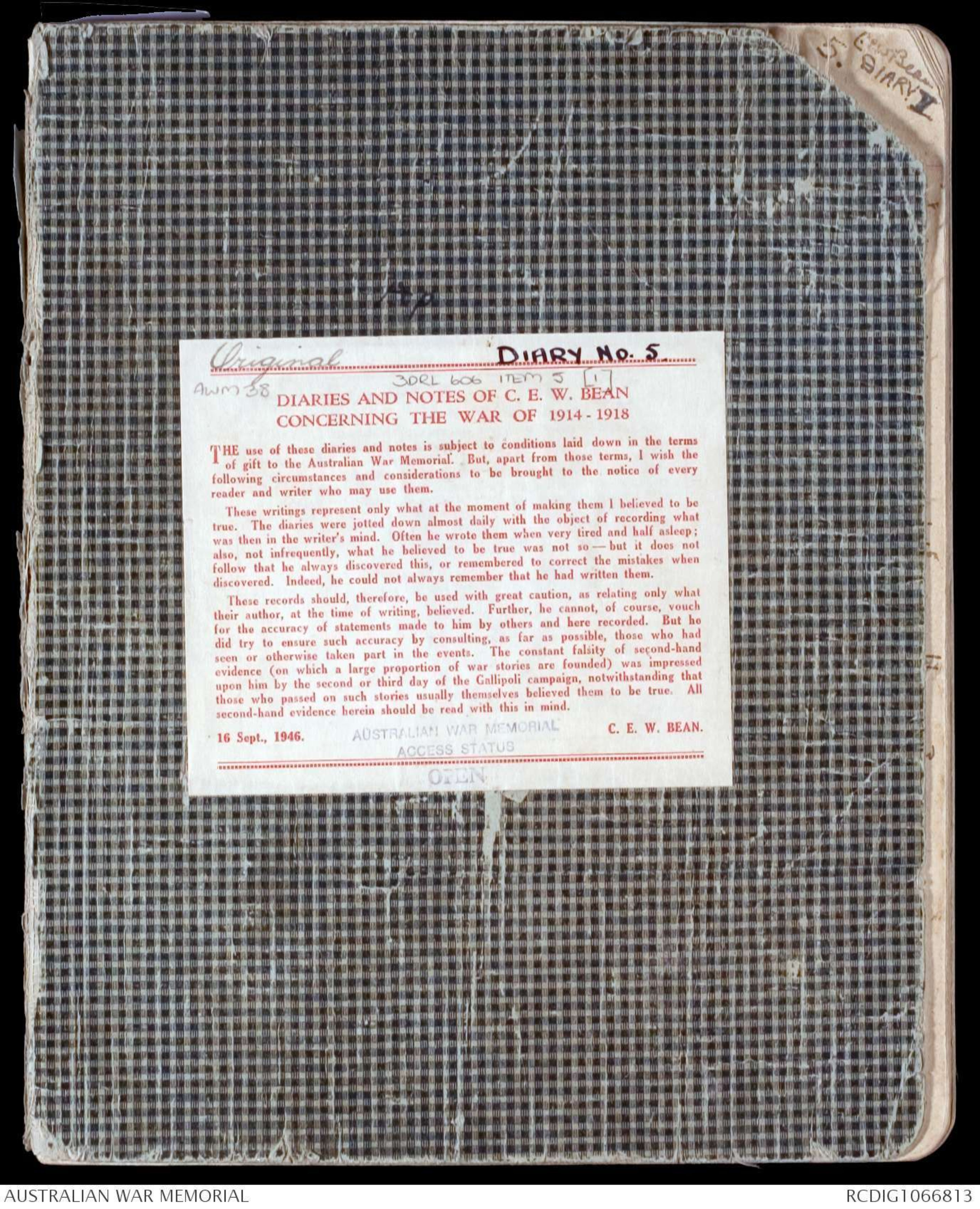
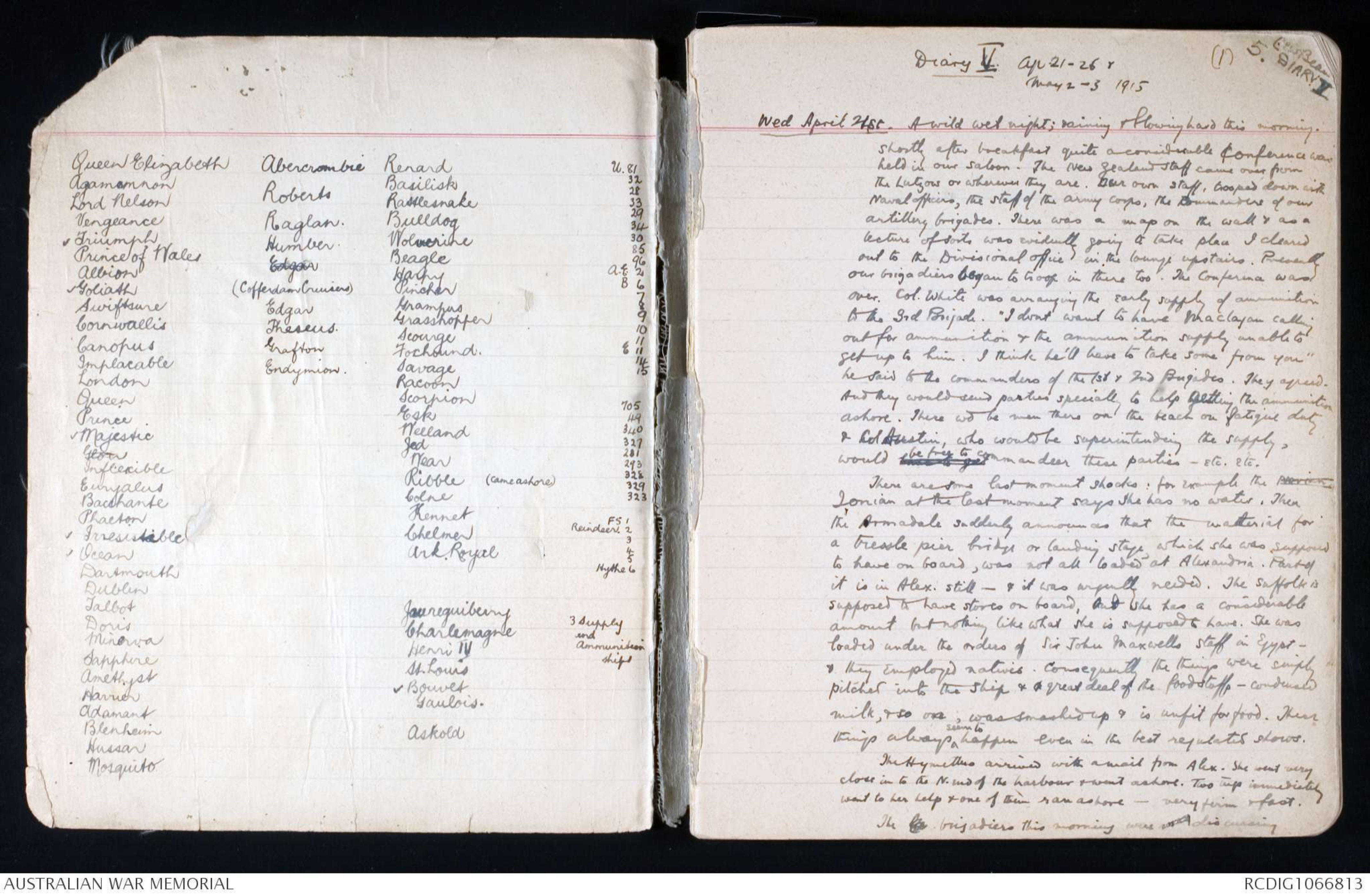
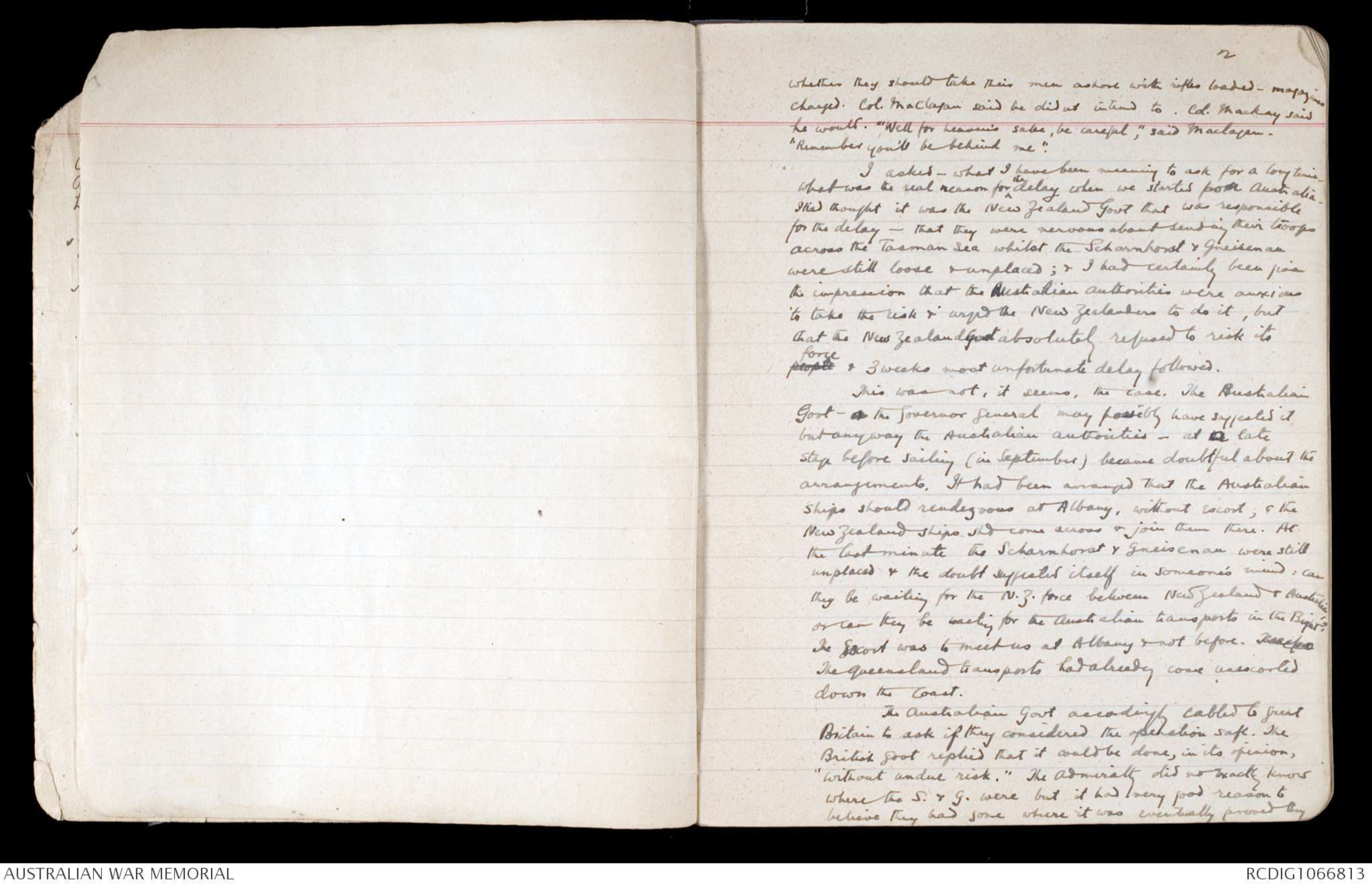
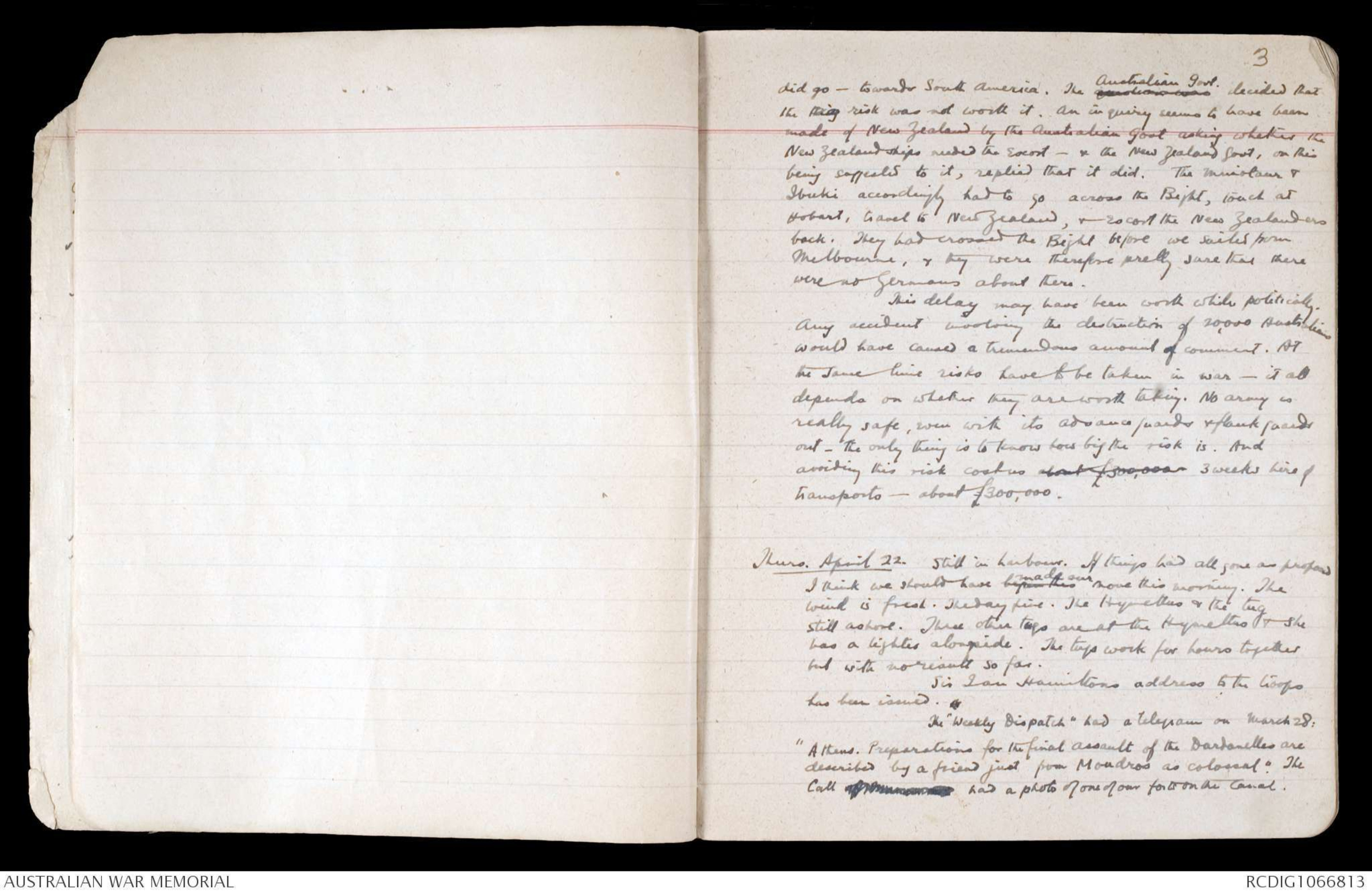
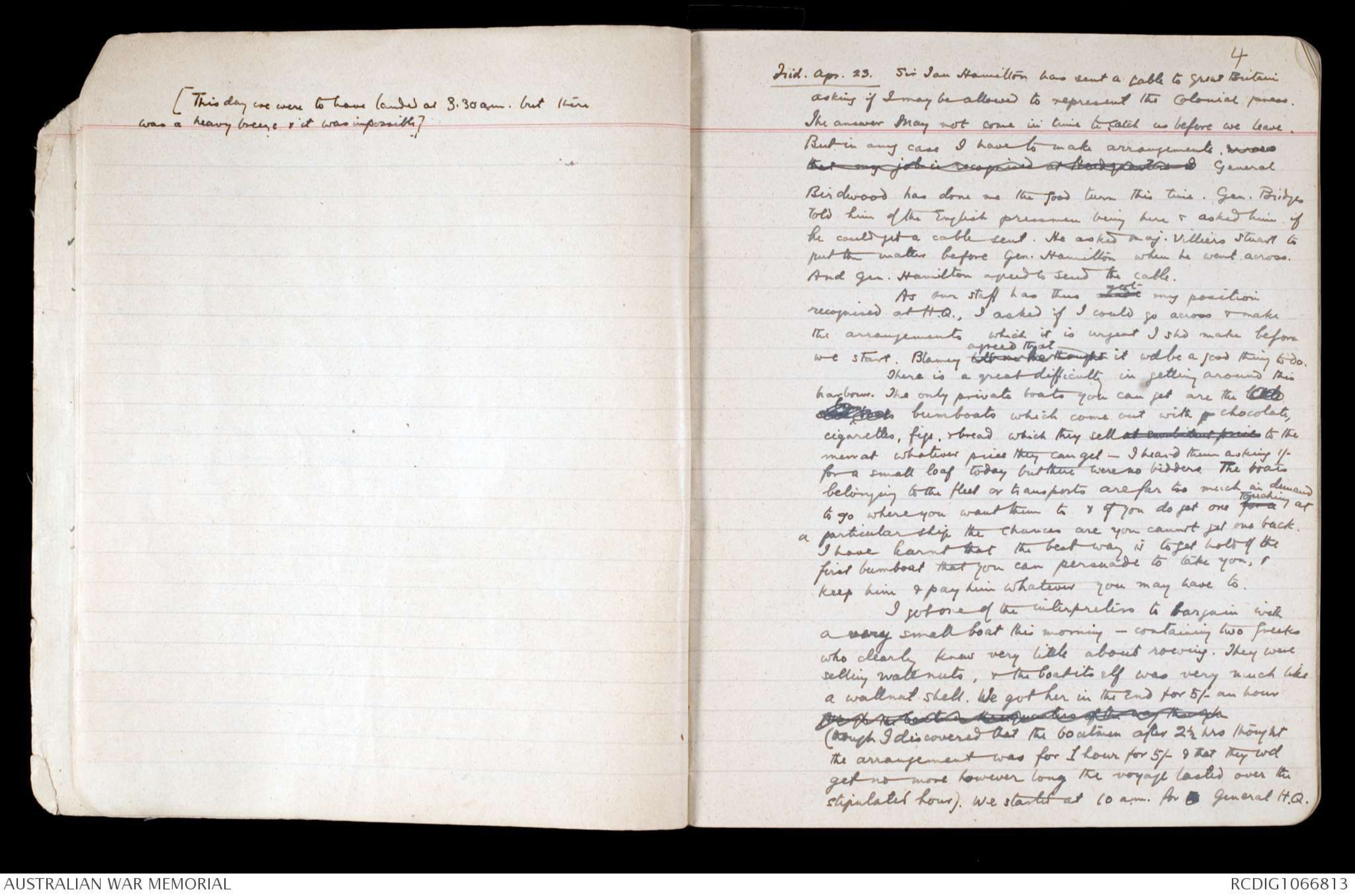
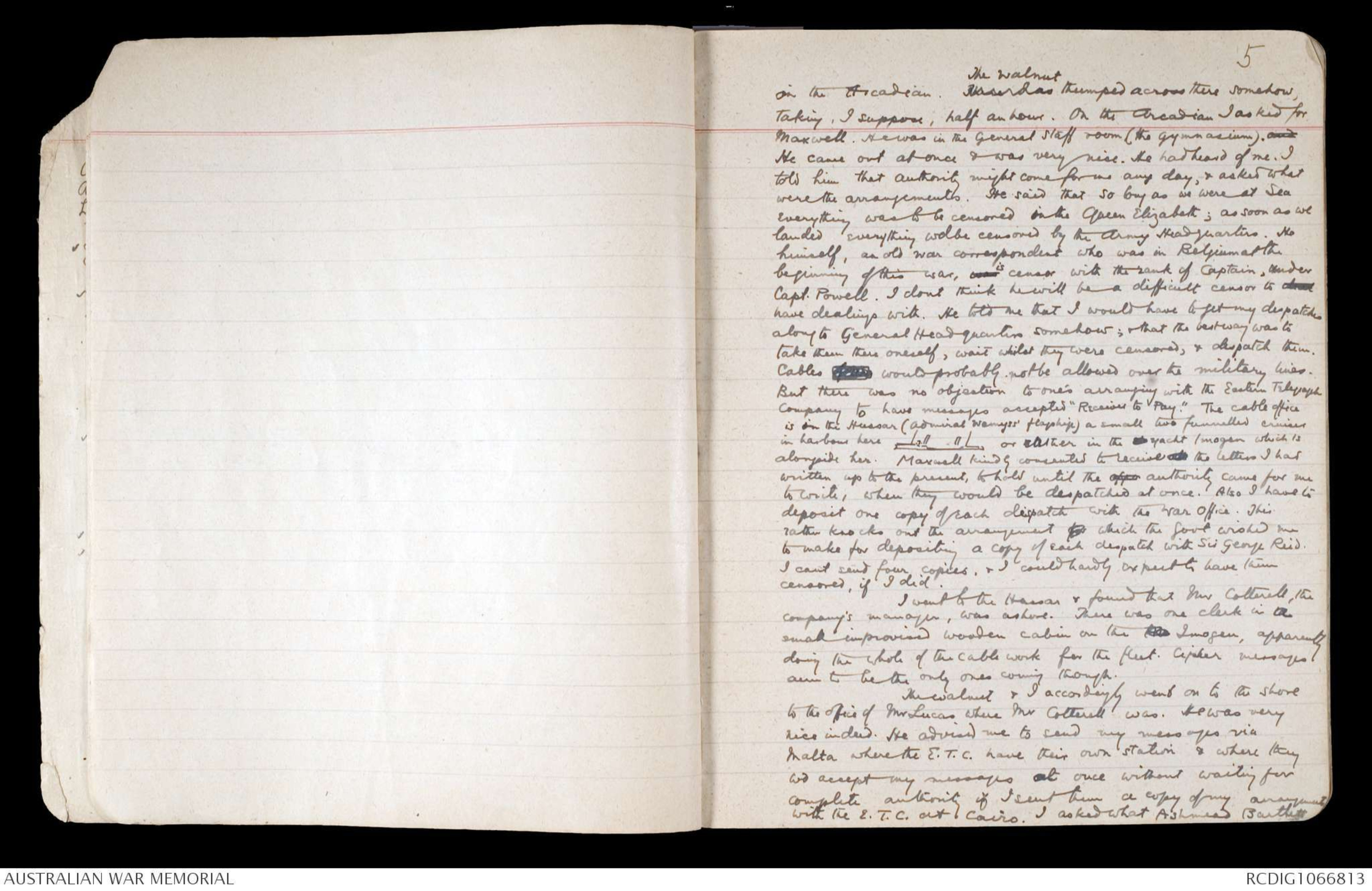
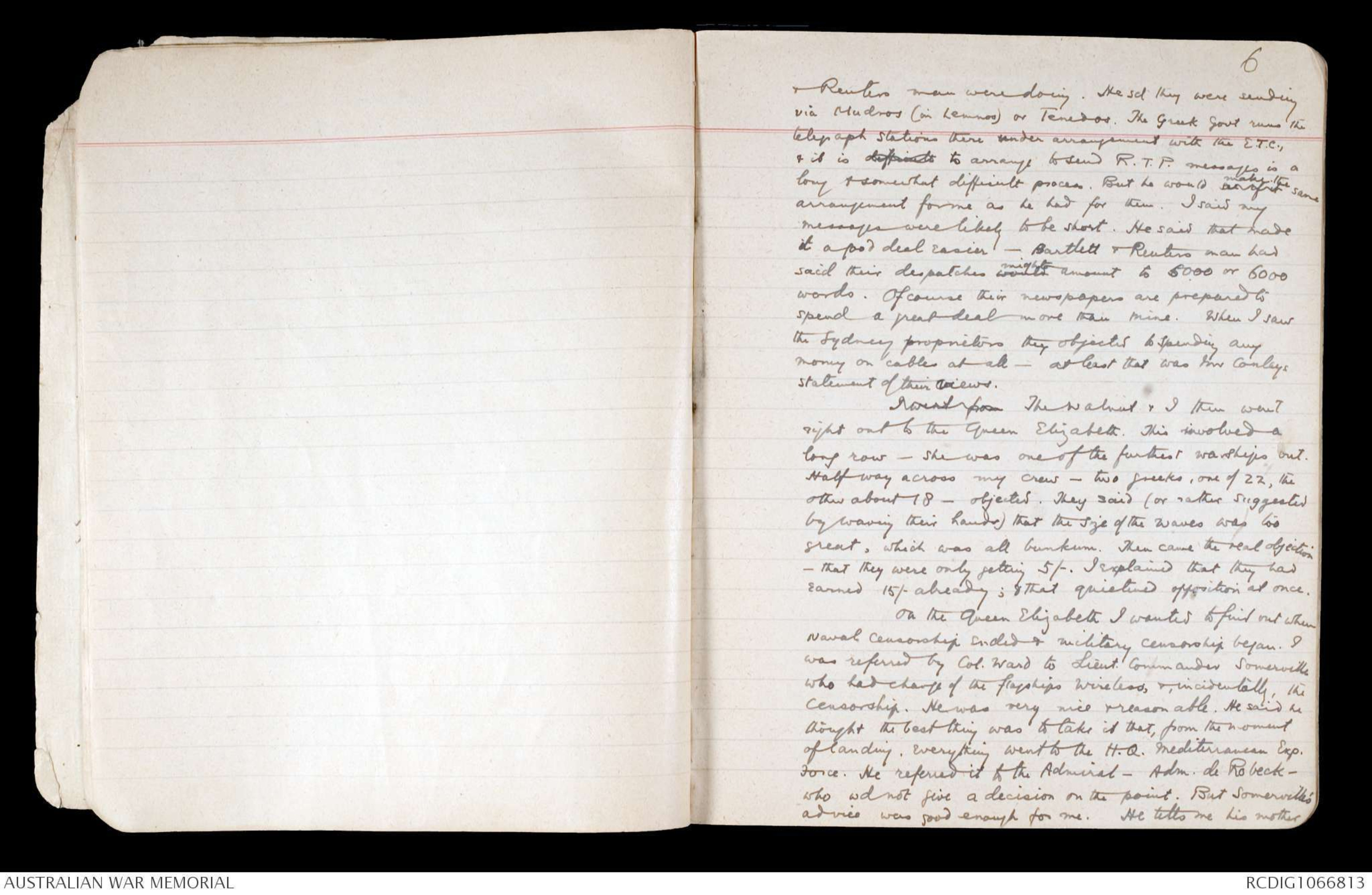
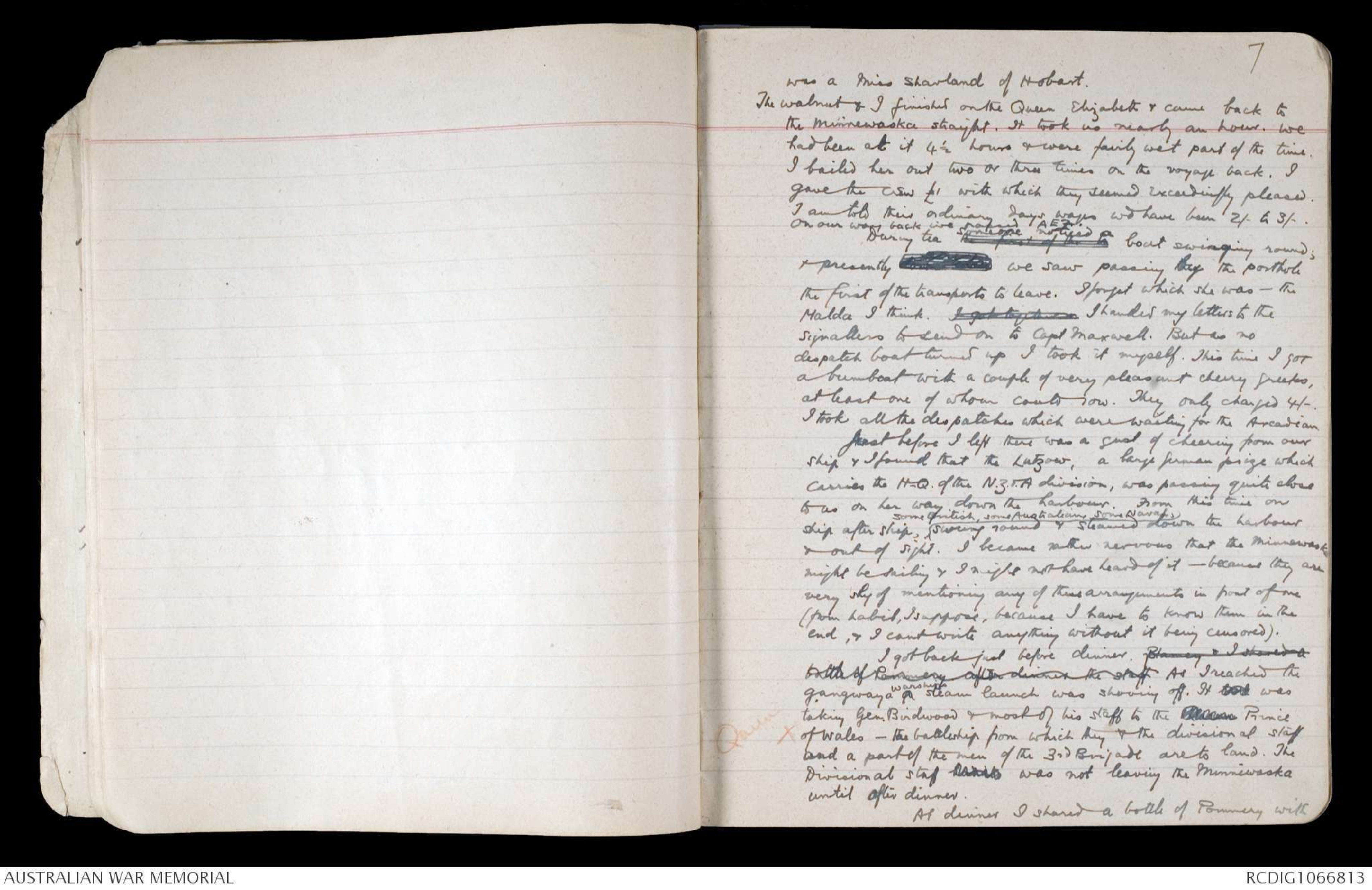
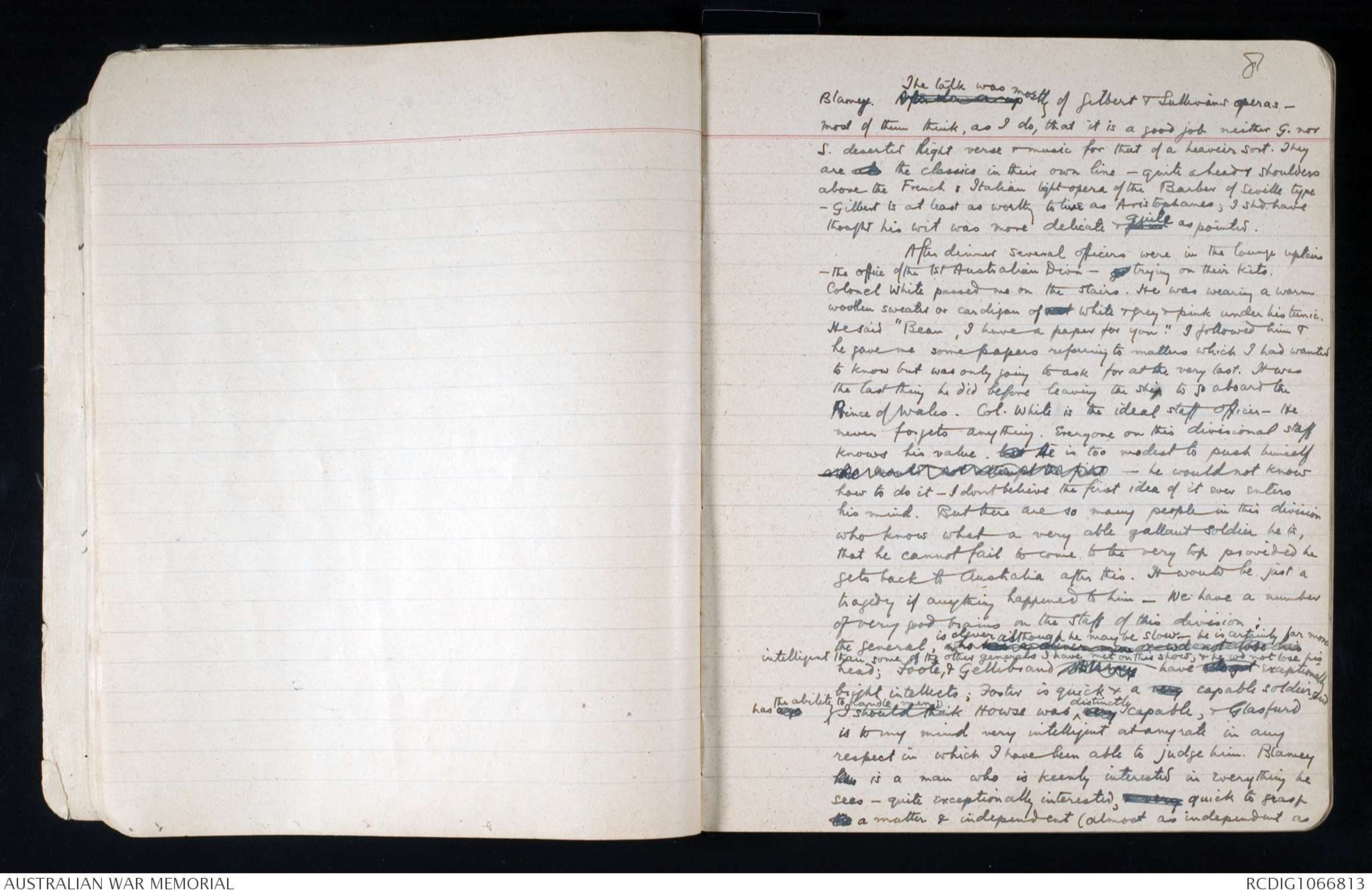
AWM38
Official History,
1914-1918 War: Records of C E W Bean,
Official Historian.
Diaries and Notebooks
Item number: 3DRL606/5/1
Title: Diary, April - May 1915
Describes week before and after the landing,
includes extracts of signals and notes from Brig
Gen D J Glasfurd's diary.
AWM38-3DR606/5/1
C.EW Bean
5. DIARY V
Original DIARY No. 5.
AWM 38 3DRL 606 ITEM 5 [1]
DIARIES AND NOTES OF C. E. W. BEAN
CONCERNING THE WAR OF 1914 - 1918
THE use of these diaries and notes is subject to conditions laid down in the terms
of gift to the Australian War Memorial. But, apart from those terms, I wish the
following circumstances and considerations to be brought to the notice of every
reader and writer who may use them.
These writings represent only what at the moment of making them I believed to be
true. The diaries were jotted down almost daily with the object of recording what
was then in the writer's mind. Often he wrote them when very tired and half asleep;
also, not infrequently, what he believed to be true was not so - but it does not
follow that he always discovered this, or remembered to correct the mistakes when
discovered. Indeed, he could not always remember that he had written them.
These records should, therefore, be used with great caution, as relating only what
their author, at the time of writing, believed. Further, he cannot, of course, vouch
for the accuracy of statements made to him by others and here recorded. But he
did try to ensure such accuracy by consulting, as far as possible, those who had
seen or otherwise taken part in the events. The constant falsity of second-hand
evidence (on which a large proportion of war stories are founded) was impressed
upon him by the second or third day of the Gallipoli campaign, notwithstanding that
those who passed on such stories usually themselves believed them to be true. All
second-hand evidence herein should be read with this in mind.
16 Sept., 1946. C. E. W. BEAN.
AUSTRALIAN WAR MEMORIAL
ACCESS STATUS
OPEN
Queen Elizabeth Abercrombie Renard U. 81
Agamemnon Roberts Basilisk 32
Lord Nelson Raglan. Rattlesnake 28
Vengeance Humber. Bulldog 33
√ Triumph Edgar Wolverine 29
Prince of Wales (Cofferdam Cruisers) Beagle 34
Albion Edgar Harpy 30
√ Goliath Theseus. Pincher 85
Swiftsure Grafton Grampus 96
Cornwallis Endymion. Grasshopper A.E. 2
Canopus Scourge B 6
Implacable Fochound. 7
London Savage 8
Queen Racoon 9
Prince Scorpion 10
√ Majestic Esk 11Geor Nelland E 11
Inflexible Jed 14
Euryalus Near 15
Bacchante Ribble (came ashore)
Phaeton Colne 705
√ Irresistible Kennet 49
√ Ocean Chelmer 340
Dartmouth Ark. Royal 327
Dublin 281
Talbot 293
Doris 328
Minerva 329
Sapphire 323
Amethyst FS 1
Harrier Reindeer. 2
Adamant 3
Blenheim 4
Hussar 5
Mosquito Hythe 6
Jaureguiberry 3 Supply
Charlemagne and
Henry IV Ammunition
St. Louis ships
√ Bouvet
Gaulois.
Askold
C.EW Bean
5. DIARY V
(1)
Diary V Ap 21-26 &
May 2-3 1915
Wed April 21st. A wild wet night; raining & blowing hard this morning.
Shortly after breakfast quite a considerable conference was
held in our saloon. The New Zealand staff came over from
the Lutzow or wherever they are. Our own staff, trooped down with
Naval officers, the staff of the army corps, the Commanders of our
artillery brigades. There was a map on the wall & as a
lecture of sorts was evidently going to take place I cleared
out to the Divisional office in the lounge upstairs. Presently
our brigadiers began to troop in there too. The Conference was
over. Col. White was arranging the early supply of ammunition
to the 3rd Brigade. "I dont want to have Maclagan calling
out for ammunition & the ammunition supply unable to
get up to him. I think he'll have to take some from you"
he said to the commanders of the 1st & 2nd Brigades. They agreed.
And they would send parties specially to help getting the ammunition
ashore. There wd be men there on the beach on fatigue duty
& Col Austin, who would be superintending the supply,
would have to get be free to commandeer these parties - etc. etc.
There are some last moment shocks: for example the Nerian
Ionian at the last moment says she has no water. Then
the Armadale suddenly announces that the material for
a tressle pier bridge or landing stage, which she was supposed
to have on board, was not all loaded at Alexandria. Part of
it is in Alex. still - & it was urgently needed. The Suffolk is
supposed to have stores on board, but she has a considerable
amount but nothing like what she is supposed to have. She was
loaded under the orders of Sir John Maxwells staff in Egypt -
& they employed natives. Consequently the things were simply
pitched into the ship & a great deal of the foodstuffs - condensed
milk, & so on, was smashed up & is unfit for food. These
things always ^ seem to happen even in the best regulated shows.
The Hymettus arrived with a mail from Alex. She went very
close in to the N. end of the harbour & went ashore. Two tugs immediately
went to help her & one of them ran ashore - very firm & fast.
The br brigadiers this morning were away discussing
2
whether they should take their men ashore with rifles loaded - magazines
charged. Col. Maclagan said he did nt intend to. Col. Mackay said
he would. "Well for heaven's sake, be careful", said Maclagan.
"Remember you'll be behind me".
I asked - what I have been meaning to ask for a long time -
what was the real reason for ^ the delay when we started from Australia.
I had thought it was the New Zealand Govt that was responsible
for the delay - that they were nervous about sending their troops
across the Tasman Sea whilst the Scharnhorst & Gneisenau
were still loose and unplaced; & I had certainly been given
the impression that the Australian authorities were anxious
to take the risk & urged the New Zealanders to do it, but
that the New Zealand Govt absolutely refused to risk itspeople force & 3 weeks most unfortunate delay followed.
This was not, it seems, the case. The Australian
Govt - or the Governor General may possibly have suggested it,
but anyway the Australian authorities - at a late
stage before sailing (in September) became doubtful about the
arrangements. It had been arranged that the Australian
ships should rendezvous at Albany, without escort, & the
New Zealand ships shd come across and join them there. At
the last minute the Scharnhorst and Gneisenau were still
unplaced & the doubt suggested itself in someone's mind: can
they be waiting for the N.Z. force between New Zealand & Australia
or can they be waiting for the Australian transports in the Bight?
The escort was to meet us at Albany & not before. Therefore
The Queensland transports had already come unescorted
down the coast.
The Australian Govt accordingly cabled to Great
Britain to ask if they considered the operation safe. The
British Govt replied that it could be done, in its opinion,
"without undue risk." The Admiralty did not exactly know
where the S. & G. were but it had very good reason to
believe they had gone where it was eventually proved they
3
did go - towards South America. The question was Australian Govt . decided that
the big risk was not worth it. An inquiry seems to have been
made of New Zealand by the Australian Govt asking whether the
New Zealand ships needed the escort- & the New Zealand Govt, on this
being suggested to it, replied that it did. The Minotaur &
Ibuki accordingly had to go across the Bight, touch at
Hobart, travel to New Zealand, - & escort the New Zealanders
back. They had crossed the Bight before we sailed from
Melbourne, & they were therefore pretty sure that there
were no Germans about there.
This delay may have been worthwhile politically.
Any accident involving the destruction of 20,000 Australians
would have caused a tremendous amount of comment. At
the same time risks have to be taken in war - it all
depends on whether they are worth taking. No army is
really safe, even with its advance guards & flank guards
out - The only thing is to know how big the risk is. And
avoiding this risk cost us about £300,000 3 weeks hire of
transports - about £300,000.
Thurs. April 22. Still in harbour. If things had all gone as proposed
I think we should have begun this made our move this morning. The
wind is fresh. The day fine. The Hymettus & the tug
still ashore. Three other tugs are at the Hymettus & she
has a lighter alongside. The tugs work for hours together
but with no result so far.
Sir Ian Hamiltons address to the troops
has been issued. x
The "Weekly Dispatch" had a telegram on March 28:
"Athens. Preparations for the final assault of the Dardanelles are
described by a friend from Moudros as colossal". The
Call xxxxxxxxx had a photo of one of our forts on the Canal.
[This day we were to have landed at 3.30am. but there
was a heavy breeze & it was impossible]
4
Frid. Apr. 23. Sir Ian Hamilton has sent a cable to Great Britain
asking if I may be allowed to represent the Colonial press.
The answer may not come in time to catch us before we leave.
But in any case I have to make arrangements. meansthat my job is recognised at headquarters & General
Birdwood has done me the good turn this time. Gen. Bridges
told him of the English pressmen being here & asked him if
he could get a cable sent. He asked Maj. Villiers Stuart to
put the matter before Gen. Hamilton when he went across.
And Gen. Hamilton agreed to send the cable.
As our staff has thus made got my position
recognised at H.Q., I asked if I could go across & make
the arrangements which it is urgent I shd make before
we start. Blamey told me he thought agreed that it wd be a good thing to do.
There is a great difficulty in getting around this
harbour. The only private boats you can get are the littlexxxxxxboats bumboats which come out with p chocolate,
cigarettes, figs, & bread which they sell at exorbitant prices to the
men at whatever price they can get - I heard them asking 1/-
for a small loaf today but there were no bidders. The boats
belonging to the fleet or transports are far too much in demand
to go where you want them to & if you do get one for a touching at
a particular ship the chances are you cannot get one back.
I have learnt that the best way is to get hold of the
first bumboat that you can persuade to take you, &
keep him & pay him whatever you may have to.
I got one of the interpreters to bargain with
a very small boat this morning - containing two Greeks
who clearly knew very little about rowing. They were
selling wallnuts, & the boat itself was very much like
a wallnut shell. We got her in the end for 5/- an hourthough the boatman three quarters of the way through
(though I discovered that the boatmen after 2½ hrs thought
the arrangement was for 1 hour for 5/- & that they wd
get no more however long the voyage lasted over the
stipulated hour). We started at 10am. for G General H.Q.
5
on the Arcadian. There has The walnut thumped across there somehow,
taking, I suppose, half an hour. On the Arcadian I asked for
Maxwell. He was in the General staff room (the gymnasium). and
He came out at once & was very nice. He had heard of me. I
told him that authority might come for me any day, & asked what
were the arrangements. He said that so long as we were at sea
everything was to be censored in the Queen Elizabeth; as soon as we
landed everything wd be censored by the Army Headquarters. He
himself, an old war correspondent who was in Belgium at the
beginning of this war, was is censor with the rank of Captain, under
Capt. Powell. I dont think he will be a difficult censor to deal
have dealings with. He told me that I would have to get my despatches
along to General Headquarters somehow; & that the best way was to
take them there oneself, wait whilst they were censored, & despatch them.
Cables xxxxx would probably not be allowed over the military lines.
But there was no objection to one's arranging with the Eastern Telegraph
Company to have messages accepted "Receiver to Pay". The cable office
is in the Hussar (Admiral Wemyss' flagship) a small two funnelled cruiser
in harbour here [Sketch - see original] or rather in the xxx yacht Imogen which is
alongside her. Maxwell kindly consented to receive all the letters I had
written up to the present, to hold until the offi authority came for me
to write, when they would be despatched at once. Also I have to
deposit one copy of each despatch with the War Office. This
rather knocks out the arrangement for which the Govt wished me
to make for depositing a copy of each despatch with Sir George Reid.
I cant send four copies, & I could hardly expect to have them
censored, if I did.
I went to the Hussar & found that Mr Cotterell, the
company's manager, was ashore. There was one clerk in the
small improvised wooden cabin on the xxx Imogen, apparently
doing the whole of the cable work for the fleet. Cipher messages
seem to be the only ones coming through.
The walnut & I accordingly went on to the shore
to the office of Mr Lucas where Mr Cotterell was. He was very
nice indeed. He advised me to send my messages via
Malta where the E.T.C. have their own station & where they
wd accept my messages at once without waiting for
complete authority if I sent him a copy of my arrangement
with the E.T.C. at Cairo. I asked what Ashmead Bartlett
6
& Reuters man were doing. He said they were sending
via Mudros (in Lemnos) or Tenedos. The Greek Govt runs the
telegraph stations there under arrangement with the E.T.C.,
& it is difficult to arrange to send R.T.P. messages is a
long & somewhat difficult process. But he would see of it make the same
arrangement for me as he had for them. I said my
messages were likely to be short. He said that made
it a good deal easier - Bartlett & Reuters man had
said their despatches would might amount to 5000 or 6000
words. Of course their newspapers are prepared to
spend a great deal more than mine. When I saw
the Sydney proprietors they objected to spending any
money on cables at all - at least that was Mr Conleys
statement of their views.I went from The walnut & I then went
right out to the Queen Elizabeth. This involved a
long row - she was one of the furthest warships out.
Half way across my crew - two greeks, one of 22, the
other about 18 - objected. They said (or rather suggested
by waving their hands) that the size of the waves was too
great, which was all bunkum. Then came the real objection
- that they were only getting 5/-. I explained that they had
earned 15/- already; & that quietened opposition at once.
On the Queen Elizabeth I wanted to find out when
Naval Censorship ended & military censorship began. I
was referred by Col. Ward to Lieut. Commander Somerville
who had charge of the flagships wireless, &, incidentally, the
censorship. He was very nice & reasonable. He said he
thought the best thing was to take it that, from the moment
of landing, everything went to the H.Q. Mediterranean Exp.
Force. He referred it to the Admiral - Adm. de Robeck -
who wd not give a decision on the point. But Somerville's
advice was good enough for me. He tells me his mother
7
was a Miss Sharland of Hobart.
The walnut & I finished on the Queen Elizabeth& came back to
the Minnewaska straight. It took us nearly an hour. We
had been at it 4½ hours & were fairly wet part of the time.
I bailed her out two or three times on the voyage back. I
gave the crew £1 with which they seemed exceedingly pleased.
I am told their ordinary days wages wd have been 2/- to 3/-.
On our way back we passed AE7.
During tea the first of the bo someone noticed a boat swinging round;
& presently xxxxxxxxx we saw passing by the porthole
the first of the transports to leave. I forget which she was - the
Malda I think. I got together I handed my letters to the
signallers to send on to Capt Maxwell. But as no
despatch boat turned up I took it myself. This time I got
a bumboat with a couple of very pleasant cheery Greeks,
at least one of whom could row. They only charged 4/-.
I took all the despatches which were waiting for the Arcadian.
Just before I left there was a gust of cheering from our
ship & I found that the Lutzow, a large German prize which
carries the H.Q. of the N.Z.&.A. division, was passing quite close
to us on her way down the harbour. From this time on
ship after ship, ^ some British, some Australian, some Naval, swung round & steamed down the harbour
& out of sight. I became rather nervous that the Minnewaska
might be sailing & I might not have heard of it - because they are
very shy of mentioning any of these arrangements in front of me
(from habit, I suppose, because I have to know them in the
end, & I cant write anything without it being censored).
I got back just before dinner. Blamey & I shared abottle of Pommery. After dinner the staff As I reached the
gangway a ^ warships steam launch was shoving off. It took was
taking Gen. Birdwood & most of his staff to the xxxxxx Prince
[*Queen X*] of Wales - the battleship from which they & the divisional staff
and a part of the men from the 3rd Brigade are to land. The
Divisional staff xxxx was not leaving the Minnewaska
until after dinner.
At dinner I shared a bottle of Pommery with
8
Blamey. After dinner a cup The talk was mostly of Gilbert & Sullivans operas -
most of them think, as I do, that it is a good job that neither G. nor
S. deserted light verse & music for that of a heavier sort. They
are xxx the classics in their own line - quite a head & shoulders
above the French & Italian light opera of the Barber of Seville type
- Gilbert is at least as worthy to live as Aristophanes; I shd have
thought his wit was more delicate & jus as quite as pointed.
After dinner several officers were in the lounge upstairs
- the office of the 1st Australian Divn - go trying on their kits.
Colonel White passed me on the stairs. He was wearing a warm
woollen sweater or cardigan of wit white & grey & pink under his tunic.
He said "Bean, I have a paper for you." I followed him &
he gave me some papers referring to matters which I had wanted
to know but was only going to ask for at the very last. It was
the last thing he did before leaving the ship to go aboard the
Prince of Wales. Col. White is the ideal staff officer - He
never forgets anything. Everyone on this divisional staff
knows his value. but He is too modest to push himselfand would not attempt the first - he would not know
how to do it - I dont believe the first idea of it ever enters
his mind. But there are so many people in this division
who know what a very able gallant soldier he is,
that he cannot fail to come to the very top provided he
gets back to Australia after this. It would be just a
tragedy if anything happened to him - We have a number
of very good brains on the staff of this division:
the general, who is a clever man & wd not lose his is clever although he may be slow - he is certainly far more
intelligent than some of the other generals I have met on this show, & he wd not lose his
head; Foote, & Gellibrand xxxxxxxx have also got exceptionally
bright intellects; Foster is quick & a very capable soldier and
has a go the ability to handle men. I should think Howse was ^ very distinctly capable, & Glasfurd
is to my mind very intelligent at any rate in any
respect in which I have been able to judge him. Blameyhas is a man who is keenly interested in everything he
sees - quite exceptionally interested, & very quick to graspthe a matter & independent (almost as independent as
 Arlene Baade
Arlene BaadeThis transcription item is now locked to you for editing. To release the lock either Save your changes or Cancel.
This lock will be automatically released after 60 minutes of inactivity.